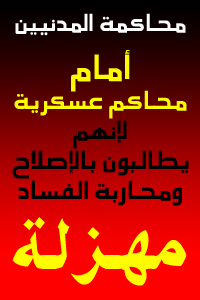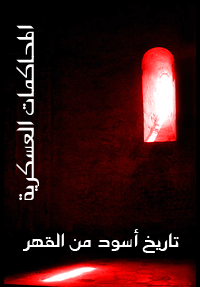
Behind closed doors
The justice systems in Britain and the US may not be perfect. But viewed from Egypt, the jurisprudence and transparency that attend the vast majority of trials there are very much to be envied.
In Cairo today, some 40 leading members of the Muslim Brotherhood are facing a secret military tribunal. Thirty sessions have been held so far, while all journalists, reporters and domestic or international human rights observers have been denied access. These members of the country's most powerful political opposition - which holds about a fifth of the seats in Egypt's parliament - stand before this tribunal despite civilian courts acquitting them four times of all charges brought by the notorious state security prosecutor, describing them as "fabricated, groundless, and politically motivated".
They are standing before the tribunal despite a court ruling that found the president's decision to transfer them to a military tribunal "unconstitutional", on the basis that they are civilian opposition leaders who should be tried by civilian courts. The treatment of these representatives of the region's largest Islamist movement, which advocates a moderate, peaceful approach, has been roundly condemned by international human rights organisations, including Amnesty International and Human Rights Watch.
The defendants, including the group's deputy chairman, Khayrat El Shater, face charges of money laundering and supporting terrorism, among others. The prosecution's main witness is the state security officer who presided over investigations. In his testimony, he failed to present any substantial evidence to support his claims. He was unaware of the names and professions of some of the defendants, he refused to respond to most of the defence questions, and he contradicted himself in testimony.
But all this took place behind closed doors. The only people granted access to the courtroom were the judge (a military officer beholden to his seniors), witnesses (who are state security officers), detainees and their families. Strict procedures have been imposed in order to guarantee that no account of what happens inside the courtroom could reach the outside world except through families and lawyers, who could easily be discredited. With these mounting legal violations, in the courtroom last week defendants threatened to boycott further sessions.
The agenda behind this is all too clear. The popularity of President Hosni Mubarak's regime is rapidly eroding, owing to its political, social and economic failures, both domestically and internationally. This has engendered a febrile enthusiasm to speed up the succession plan in which Gamal Mubarak inherits the presidency from his 80-year-old father, in the face of profound popular opposition.
With mounting public discontent and an unprecedented wave of strikes - the most recent by cotton factory workers protesting at their £13 monthly pay - the administration has resorted to extra-legal measures to silence the opposition. These are more than mere scare tactics. Ayman Nour, an articulate young politician and a potential opponent for Gamal Mubarak in any future elections, has been sentenced to five years in prison; Talaat El Sadat MP, nephew of the late President Sadat and an outspoken parliamentarian, was sentenced to a year in prison; and hundreds of Muslim Brotherhood activists have been detained without charge.
Arrests continue, as recently as last week, as part of a systematic crackdown on this political group. And the presidency's paranoia and contempt for human rights extends beyond the Muslim Brotherhood. In the past few weeks, four non-Islamist independent newspaper editors were sentenced to prison terms after being found guilty of defaming ruling figures, while others face trials on similarly absurd charges.
In Egypt today an oppressive regime is imposing draconian measures upon its people. It is depriving citizens of their freedom and flying in the face of judicial sanction. And all the while, the vast majority of western governments, observers and civil organisations remain mute. The silence that has greeted this assault on human rights and democracy is deafening. Anyone with a genuine interest in bringing justice and freedom to Egypt should bring all possible pressure to bear - both through words and actions.
· Ibrahim El Houdaiby is a columnist for the Muslim Brotherhood's English language website,
Labels: مشاركات
9 التعليقات :



























































































































































































Feel free to surf to my web blog ... http://www.getfitnstrong.com/adjustable-dumbbells/3-great-adjustable-weights-affordable-prices/
use any time you needed to exercise.
My web site Report abuse
plan suggestions to by yourself.
Also visit my webpage bowflex 552
Here is my site; mouse click the next webpage
is in fact very simple to operate and adjust.
Here is my site: discount fitness equipment
My blog post click through the up coming web site
my weblog - adjustable dumbbells
about a coil to generate controlled resistance.
Stop by my web site ... bowflex selecttech 552 dumbbells review
and adaptable and supplies dozens of bodily workouts
to get a complete physique exercise.
My page: http://www.getfitnstrong.com/adjustable-dumbbells/3-great-adjustable-weights-affordable-prices/